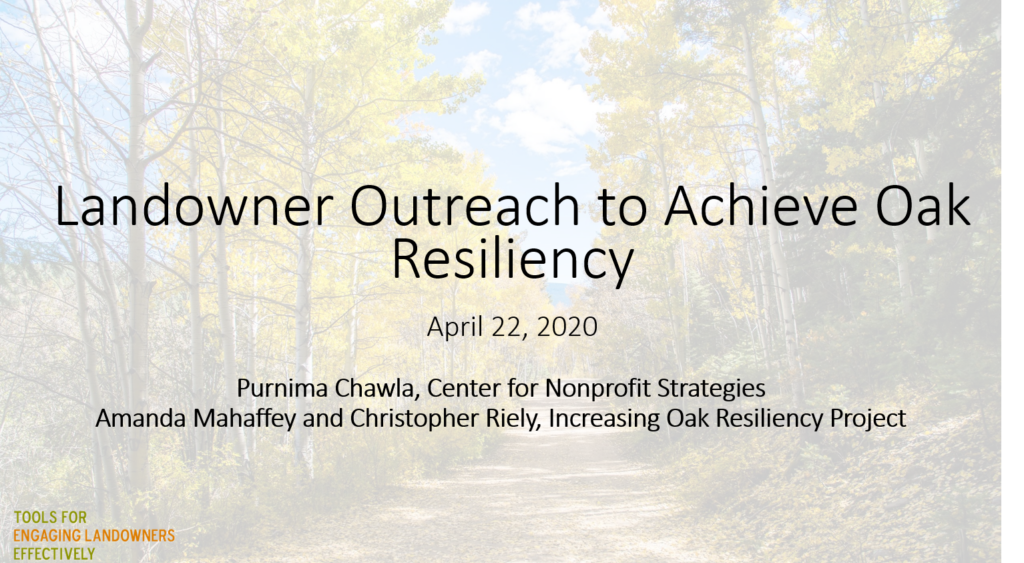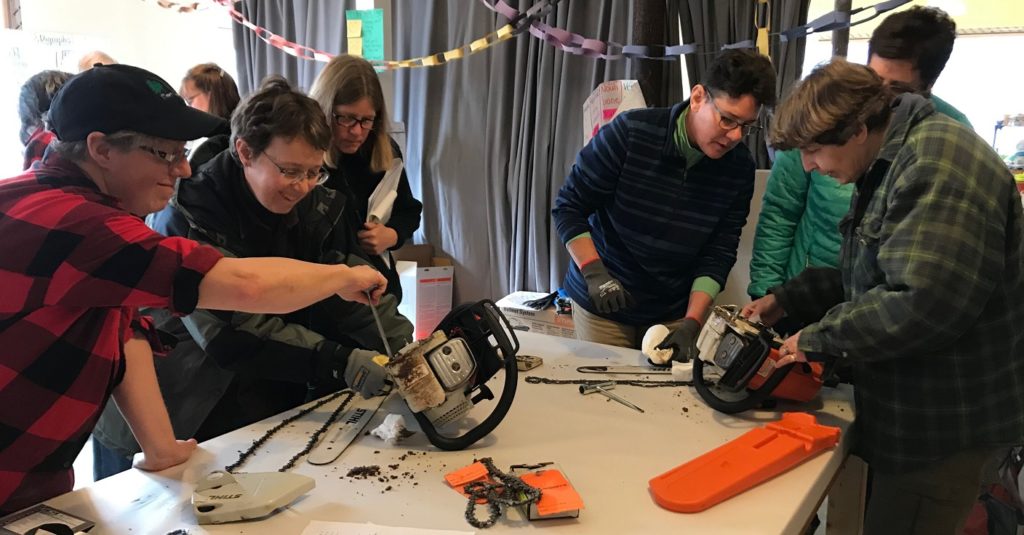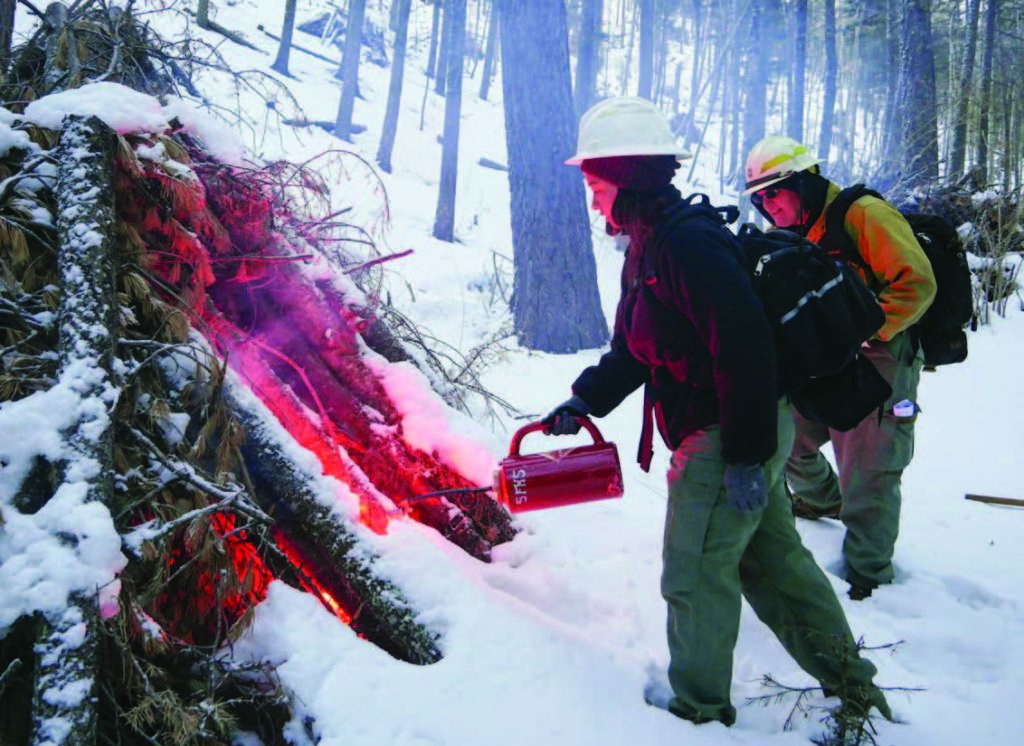Re-creating Collaboration
 Written by Leonora Pepper and Zander Evans
Written by Leonora Pepper and Zander Evans
The pandemic is forcing many of us to rethink how we work, particularly around collaboration. The Guild is meeting the challenge, at a time when collaboration is essential on all fronts. We have increased online learning opportunities, while looking forward to when it’s possible to gather again safely for field discussions. Watch for a recording soon of our recent Career Call, to help our student members connect with professionals in the field for support during unprecedented learning and career challenges. A recent publication from our colleagues at Sustainable Northwest, an NGO focused on collaborative conservation in Oregon and Washington, is titled Resources and Best Practices for Adjusting to Remote Collaboration. This guide has suggestions for how to hold effective online meetings and some general resources for dealing with the pandemic.
In May, a webinar on Communicating with Landowners about Oak Resiliency offered insights and practices for crafting a targeted approach to landowner outreach. This was an interactive webinar in which participants considered landowner scenarios, then generated ideas for outreach approaches. In one scenario, the landowners’ concern about the Covid-19 outbreak factored in to their management objectives. The lessons offered in the webinar, including how to tailor outreach efforts to resonate with landowners’ motivations or concerns, will be useful during field seasons shaped by COVID-19. A recording of the webinar can be found on the Guild’s webinar library webpage, or directly on the Guild’s YouTube Channel.
 In late April and early May, the Guild’s Amanda Mahaffey partnered with University of Maine Cooperative Extension, Tish Carr Consulting, and the Maine Organic Farmers and Gardeners Association to offer a virtual workshop on Women’s Chainsaw Safety Fundamentals. This was an interactive webinar that took place on two consecutive Saturday mornings and was conceived when an in-person, weekend-long chainsaw workshop planned for the spring had to be postponed due to Covid-19. While the virtual workshop in no way replaced the in-person training (no chainsaws were started!), it provided an introduction to chainsaw basics such as PPE, parts of a saw, safe posture, steps to starting a saw, and safety planning. These fundamentals will provide a foundation once we’re able to resume in-person workshops. Taking it online also made the training accessible to some participants with small children who would not have been able to devote a weekend to an in-person training!
In late April and early May, the Guild’s Amanda Mahaffey partnered with University of Maine Cooperative Extension, Tish Carr Consulting, and the Maine Organic Farmers and Gardeners Association to offer a virtual workshop on Women’s Chainsaw Safety Fundamentals. This was an interactive webinar that took place on two consecutive Saturday mornings and was conceived when an in-person, weekend-long chainsaw workshop planned for the spring had to be postponed due to Covid-19. While the virtual workshop in no way replaced the in-person training (no chainsaws were started!), it provided an introduction to chainsaw basics such as PPE, parts of a saw, safe posture, steps to starting a saw, and safety planning. These fundamentals will provide a foundation once we’re able to resume in-person workshops. Taking it online also made the training accessible to some participants with small children who would not have been able to devote a weekend to an in-person training!
An ongoing conversation among Women Owning Woodlands leaders considered how to re-imagine women woodland owner outreach in an era of social distancing. In late March, a virtual meeting brought together 30 WOW leaders from across the country to discuss ideas and steps being taken to navigate the shift online brought on by the pandemic. The WOW team is planning a follow-up meeting to explore new ideas and hear what has been working well as WOW leaders work to maintain engagement of women woodland owners.

Jon Boe (in back) leads a prescribed burn. Photo by Matt Dahlseid.
In the western US, the fire season is adding a new stress to the pandemic. The US Forest Service has released a statement on their approach to keeping communities and fire fighters safe this season. The Guild’s Sam Berry and Gabe Kohler interviewed Jon Boe to get a more in-depth view over how Covid-19 will affect the fire season. One of the important take-home messages is that for anyone living in a fire-adapted ecosystem, it is especially important to prepare for wildfire and reduce the threat to your home. At the same time, our National Forests are already seeing increased use and some irresponsible behavior adding to the wildfire threat. For example, despite a ban on campfires in the Santa Fe National Forest, fire patrols on the first weekend in May reported 11 abandoned campfires. The Guild’s Mike Lynch helped lead a webinar that looked at the 2019 Fire Season and the outlook for 2020 in the Southwest, which includes a discussion of fire management in the time of Covid-19.
The pandemic, social distancing measures, and economic uncertainty are forcing changes in all aspects of our work. During this time, it is reassuring to see Guild members and staff responding with creativity and resilience. Thank you for all you do, and for supporting the Guild in “putting the forest first” while staying safe and healthy.
